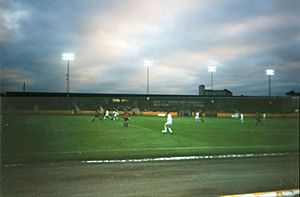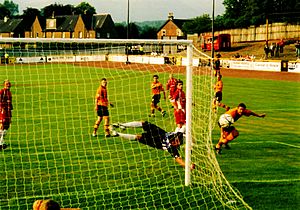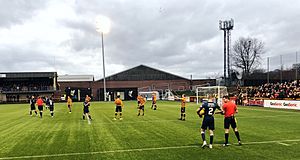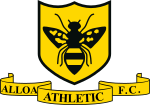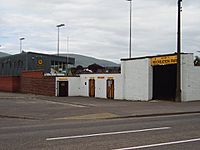Alloa Athletic F.C. facts for kids
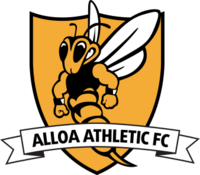 |
||||
| Full name | Alloa Athletic Football Club | |||
|---|---|---|---|---|
| Nickname(s) | The Wasps, The A-Team | |||
| Founded | 1878 | |||
| Ground | Recreation Park, Alloa | |||
| Capacity | 3,100 | |||
| Chairman | Martin Ross | |||
| Manager | Andy Graham | |||
| League | Scottish League One | |||
| 2015–16 | Scottish Championship, 10th (relegated) | |||
|
||||
Alloa Athletic Football Club is a semi-professional football team from Alloa, Clackmannanshire, Scotland. They are known as 'The Wasps' because their home colours are black and gold.
The club was formed in 1878. They play in Scottish League One as part of the Scottish Professional Football League. Alloa Athletic has played at Recreation Park since 1895. They have won the Scottish Challenge Cup once, in 1999.
Contents
Club History
Alloa Athletic was founded in 1878. The club's name changed a few times in its early years. It was first called Clackmannan County, then Alloa Association, before becoming Alloa Athletic in 1883.
In 1921, Alloa Athletic joined the Scottish Football League. They had a great first season, winning the Second Division title in 1921–22. This earned them promotion to the top league!
The club has often been a strong contender in the third tier of Scottish football. They have finished as runners-up nine times in this division.
Cup Competitions
Alloa Athletic first played in the Scottish Cup in 1883. Their best result in this competition was reaching the quarter-finals three times. The last time was in 1988.
The club's biggest success in a national cup was winning the Scottish Challenge Cup in 1999. They also reached the final two other times, in 2001 and 2015.
League Journeys
After winning the Second Division in 1922, Alloa was relegated the next season. They earned promotion again in 1938–39, but World War II stopped the season early. After the war, they were placed back in Division Two.
The 1950s and 60s were not the most successful years. However, a famous player named John White played for Alloa. He later played for Scotland and Tottenham Hotspur, where he was part of their famous team that won both the league and cup in 1960–61.
Alloa was promoted again in 1976–77 and then again in 1981–82. They even finished 6th in the First Division the next season!
In 1995, Alloa became a founding member of the new Third Division. They won this league in 1997–98, which was their first championship win since 1922. That season, they also had a huge 7–0 win against local rivals Stirling Albion.
After winning the Scottish Challenge Cup in 1999, Alloa was promoted to the First Division. They went up and down between divisions a few times in the early 2000s.
In 2011, Paul Hartley became the player-manager. He led Alloa to become Scottish Third Division champions in 2012. The next season, they earned back-to-back promotions by finishing 2nd in the Second Division and winning the play-offs. This meant they started the 2013–14 season in the new Scottish Championship, which is the second tier of Scottish football.
Since then, the club has continued to compete in the Scottish leagues, with different managers leading the team.
Team Colours and Crest
Alloa's home colours are black and either orange or gold hoops. This is why they are called "The Wasps". They have used these colours for most of their history, starting with black and orange hoops in 1882. Sometimes, they have worn all-gold or all-orange kits.
|
|
| Black and orange hoops from 1882 |
The club started having sponsors on their shirts in 1984. The first sponsor was Maclays. Over the years, different companies have sponsored the team's shirts.
Alloa Athletic first used a club crest in 1985. It showed a black wasp on a gold shield, with the club's initials. In 1994, the crest was updated to include the club's full name on a gold banner. In 2010, the crest was redesigned again, featuring a larger, more cartoon-like wasp.
Home Ground
Alloa Athletic has played at Recreation Park since 1895. The stadium is in the east of Alloa. It can hold 3,100 spectators.
The first Scottish Football League match at Recreation Park was in August 1921. Alloa won 1–0 against Stenhousemuir. The record number of fans at the stadium was 15,467. This was for a Scottish Cup match against Celtic in February 1955.
In 2007, the grass pitch was replaced with artificial turf. In 2010, a match at Recreation Park was the only one played in Scotland one winter weekend. All other games were cancelled due to freezing weather.
In 2014, Recreation Park was renamed Indodrill Stadium due to a sponsorship deal. However, many fans still call it Recreation Park or The Recs.
Supporters and Rivals
The record attendance for an Alloa home game is 15,467. This was for a Scottish Cup match against Celtic on February 5, 1955. Celtic won that game 4–2.
Alloa's local rivals are generally considered to be Stirling Albion, a nearby club.
Current Squad
|
|
Club Officials
Board Members
- Directors:
- Martin Ross (Chairman)
- Andrew Allan (Vice-chairman)
- Steven Lynch
- Dr Robert McElroy
- Secretary: Carol Edgar
- Honorary director:
- Ewen Cameron
- Honorary president:
- Mike Mulraney
Coaching Staff
- Manager: Andy Graham
- Assistant manager: Graeme Holmes
- First team coach: Niall Marshall
- Goalkeeping coach: Neil Parry
- Physio: Scott Anderson
- Head of youth: Anthony Massie
- Kit manager: Alan McGregor
- Groundsman: Alan Petrie
Club Honours
League Titles
- Division Two (before 1975) and First Division (after 1975):
- Winners (1): 1921–22
- Third Division (after 1994):
- Winners (2): 1997–98, 2011–12
- Central Football League:
- Winners (1): 1912–13
- Scottish Football Union:
- Champions (1): 1906–07
Cup Wins
- Scottish Challenge Cup:
- Winners (1): 1999
- Stirlingshire Cup:
- Winners (14): 1904–05, 1907–08, 1908–09, 1912–13, 1920–21, 1924–25, 1933–34, 1946–47, 1955–56, 1957–58, 1959–60, 1965–66, 1981–82, 1996–97
- Fife Cup:
- Winners (3): 1885–86, 1895–96, 1897–98
Club Records
- Biggest win: 9–0 against Selkirk in the Scottish Cup, November 28, 2005.
- Worst defeat: 0–10 against Dundee in the Scottish League B Division, March 8, 1947 (home game). Also 0–10 against Third Lanark in the Scottish League Cup, August 8, 1953 (home game).
- Highest home attendance: 15,467 against Celtic in the Scottish Cup, February 5, 1955.
- Most league goals in a season: Willie Crilley (49 goals in 1921–22).
- Highest transfer fee paid: £26,000 for Ross Hamilton from Stenhousemuir in July 2000.
- Highest transfer fee received: £100,000 for Greig Spence to Celtic in August 2010.
See also
 In Spanish: Alloa Athletic Football Club para niños
In Spanish: Alloa Athletic Football Club para niños
 | Selma Burke |
 | Pauline Powell Burns |
 | Frederick J. Brown |
 | Robert Blackburn |


